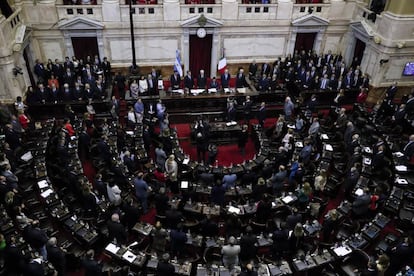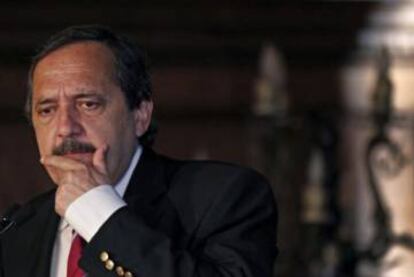Argentina’s Congress unites to prevent leniency for jailed dictatorship leaders
Impassioned session of the lower house creates unexpected unity among normally divided groups

Argentina’s Congress is often the stage for long, intense debates, yet these hardly ever attract the kind of media attention reserved for the executive in this country where the presidency is all important. But Tuesday was a special day in the lower house, with the plenary session dominated by the memory of the worst military dictatorship (1976-1983) ever suffered by Argentineans.

During a highly emotional session, deputies who are children or siblings of some of the “disappeared” delivered moving speeches that vied in intensity with the words of Ricardo Alfonsín, the son of Raúl Alfonsín – the president during whose term the dictatorship’s leaders went on trial. For one afternoon, Congress resonated with the spirit of Nunca Más (Never Again), the investigation into the atrocities committed by the regime.
“The entire world admired the Argentinean people; I saw it among Latin American and European politicians who visited my father, because we were the only country that convicted its dictators,” said Ricardo Alfonsín to a round a enthusiastic applause.
“Many of you know my story, the story of the deputy Remo Carlotto [son of the leader of the Abuelas de Plaza de Mayo movement], the story of Juan Cabandié, with whom I don’t share a lot politically, but we have something in common: the place where we were born, at the same table,” said Victoria Donda, a leftist deputy who, like the kirchnerist Cabandié, was born inside a detention center and taken from her mother right after birth, then handed over to a family with ties to the dictatorship. Her mother, like Cabandié’s, was never heard from again.
Some say that the mood is changing. It’s not true
Ricardo Alfonsín, son of former president Rául
In a country where division is the norm, all congressional groups unexpectedly came together to reject a recent Supreme Court ruling that opens the door to a sentence reduction for convicted regime leaders. The court decision adopts a “two-times-one” approach that makes any time spent in preventive detention worth twice as much as any time spent serving the sentence proper.
On Tuesday, Congress negotiated a law to limit the application of this doctrine and prevent a sentence reduction for individuals doing time for crimes against humanity. “We want a law that says that genocides are not pardoned here, that their convictions will not be overturned. We are demanding justice. This is one of the most aberrant rulings in the history of the Supreme Court,” cried Donda.
It was a rollercoaster afternoon that yielded many unexpected moments, including the moment when Carlos Kunkel, a renowned ex-member of Montoneros, a violent far-left guerrilla group from the 1970s, issued a critique of his group’s armed struggle.
“I belong to a generation that responded with violence to the violence we had suffered since 1955,” said Kunkel, who spent most of the dictatorship behind bars. “We committed excesses, and we were wrong. Ever since the restoration of democracy we have proven that we will never again go down that road. We have conveyed to the new generations that we disagree with that, and we have exercised self-criticism where it is needed: in practice.”

But it was Ricardo Alfonsín who truly had lawmakers on their feet. “Some say that the mood is changing. It’s not true. All of Argentinean society defends our fundamental values, and believes there is nothing more cruel than a dictatorship,” he said. “That is why all parties are opposing this ruling, which is a step back.”
Alfonsín, whose Radical Civic Union is part of the coalition that supports President Mauricio Macri, rejected the notion that the government was behind the Supreme Court’s decision – two out of the three justices who delivered the decision were appointed by the president.
But he did criticize some of the messages sent out by the conservative president in recent times. “What’s the point of arguing over the number of disappeared people that Argentinean society believes to be 30,000? ...How can the culture minister [Pablo Avelluto] say that his generation is lucky not to have to carry around the emotional baggage of the dictatorship? Imagine a leader of the Jewish community saying that they don’t have to carry the baggage of the Holocaust; we all carry it, because it is a crime against humanity.”
Finally, Congress passed a law setting limits on the Supreme Court’s “two-times-one” doctrine. There were 211 votes in favor, and only one against. The opponent: the controversial deputy Alfredo Olmedo, who is a household name ever since he proposed building a Trump-like wall between Argentina and Bolivia, a spot considered an entry point for drugs and illegal immigrants.
English version by Susana Urra.
Tu suscripción se está usando en otro dispositivo
¿Quieres añadir otro usuario a tu suscripción?
Si continúas leyendo en este dispositivo, no se podrá leer en el otro.
FlechaTu suscripción se está usando en otro dispositivo y solo puedes acceder a EL PAÍS desde un dispositivo a la vez.
Si quieres compartir tu cuenta, cambia tu suscripción a la modalidad Premium, así podrás añadir otro usuario. Cada uno accederá con su propia cuenta de email, lo que os permitirá personalizar vuestra experiencia en EL PAÍS.
¿Tienes una suscripción de empresa? Accede aquí para contratar más cuentas.
En el caso de no saber quién está usando tu cuenta, te recomendamos cambiar tu contraseña aquí.
Si decides continuar compartiendo tu cuenta, este mensaje se mostrará en tu dispositivo y en el de la otra persona que está usando tu cuenta de forma indefinida, afectando a tu experiencia de lectura. Puedes consultar aquí los términos y condiciones de la suscripción digital.








































